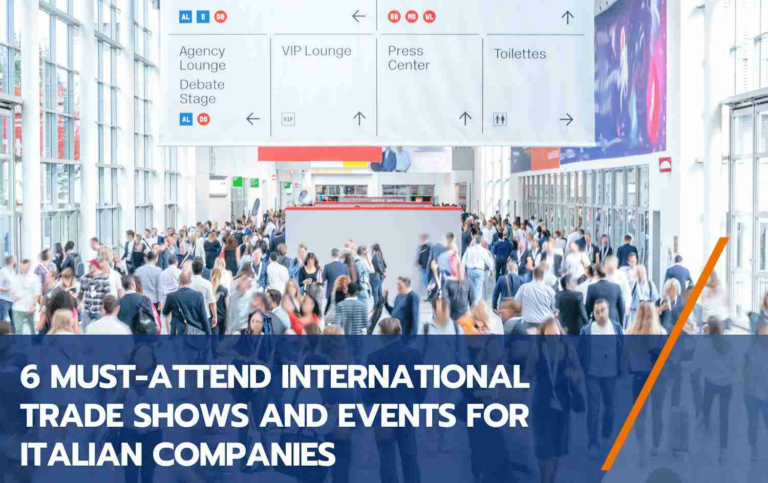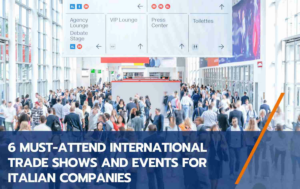Italy is renowned for its design innovation, and growing economy, which makes it an ideal place for hosting international trade shows and events. These events attract companies and experts from all over the world in search of opportunities to connect, showcase products, and establish partnerships. Italian companies highly value these trade shows as they provide opportunities for expansion and entering international markets. This article gathers the main trade shows across various industries in Italy. Our experts also provide strategies for Italian companies to maximize their participation.
Importance of Trade Shows
Trade shows provide significant opportunities for Italian companies to:
- Network: Establish connections with potential customers, partners, and industry experts.
- Market Analysis: Evaluate competition and keep up to date with current market trends.
- Sales and Marketing: Present new products and receive instante customers feedbacks.
- Partnerships: Develop relationships that can lead to fruitful collaborations.
Key International Trade Shows in Italy
1. Salone del Mobile (Milan)
- Industry Focus: Furniture and design
- Highlights: Known as the world’s leading event for furniture and design, Salone del Mobile attracts professionals from architecture, interior design, and furniture manufacturing. Its vast exhibition space showcases innovative products, concepts, and design trends. Brands often launch new collections, while emerging designers take advantage of this event to increase their international visibility.
2. EICMA (Milan)
- Industry Focus: Motorcycle and bicycle industries
- Highlights: EICMA is the world’s largest event dedicated to motorcycles, bicycles, and their accessories. Attendees have the opportunity to discover the latest models, safety equipment, and components as they connect with manufacturers, suppliers, and enthusiasts. The event also includes seminars, product testing, and exhibitions that highlight advancements in bicycle technology.
3. Vinitaly (Verona)
- Industry Focus: Wine and spirits
- Highlights: Vinitaly is a top worldwide event for the wine and spirits industry. Italian and international producers present their products to distributors, restaurant owners, wine experts, and buyers. This is a key event for the wine industry, gathering tastings, masterclasses, and workshops, providing opportunities for producers to build new distribution networks and acquire knowledge about worldwide wine trends.
4. Cibus (Parma)
- Industry Focus: Food and beverages
- Highlights: Cibus plays a fundamental role in the Italian food and beverage industry. Both local and international food brands present their products to an international audience. This event covers all food sectors, from fresh produce and dairy to packaged snacks and specialty foods. It offers companies a unique chance to understand global food trends and establish business partnerships.
5. Cosmoprof Worldwide (Bologna)
- Industry Focus: Beauty and cosmetics
- Highlights: Cosmoprof stands out at the world’s premier beauty and cosmetics trade shows. It features the latest in skincare, haircare, spa products, and fragrances. Companies can interact with distributors, wholesalers, and retailers. The event often includes trend forecasting seminars, business forums, and product launches.
6. Marmomac (Verona)
- Industry Focus: Natural stone and design
- Highlights: Marmomac is a reniwned trade fair focused on natural stone, technology, and design. It attracts architects, designers, and manufacturers interested in using marble, granite, and other natural stones. Exhibitors display new materials, processing technologies, and trends in stone applications for construction and interior design.
Strategies for Italian Companies Attending Trade Shows
- Plan in advance
- Preparation: Start planning several months ahead by researching the event, booking exhibition space, and setting up meetings.
- Logistics: Arrange travel, accommodation, and booth design to ensure your exhibition stand effectively represents your brand.
- Set Goals
- Objective Setting: Define clear objectives before the event. Are you looking to generate leads, find distributors, or simply understand market trends?
- Key Performance Indicators (KPIs): Identify KPIs such as the number of leads, partnership meetings, and customer feedback scores to measure overall success.
- Marketing Materials
- Brochures and Business Cards: Make sure brochures, business cards, and catalogs are up-to-date and available in multiple languages.
- Digital Presence: Leverage digital marketing strategies like social media and email campaigns to enhance your booth’s visibility and schedule meetings.
- Leverage Technology
- Lead Capture: Use lead-capture tools such as QR codes, apps, or CRM platforms to quickly gather visitor details.
- Live Demos and Virtual Tours: Offer live demonstrations and virtual tours to create interactive digital experiences that engage with a larger audience.
- Engage with Attendees
- Training Staff: Train your employees to interact professionally, understanding how to adapt conversations to meet the varying needs of visitors.
- Customer Insights: Record feedback and questions from visitors to refine your marketing and product strategies.
- Follow-Up Plan
- Immediate Communication: Promptly follow up with contacts made during the event. Personalized emails or calls significantly increase the chances of converting leads.
- Content Sharing: Share event highlights through newsletters, social media posts, or follow-up brochures to keep your audience engaged.
Additional Tips for Success
- Networking Events: Participate in seminars, workshops, and social gatherings to expand your network.
- Competitor Analysis: Study your competitors to understand their marketing approaches and product positioning.
- Localization: Customize your marketing message and product offerings to connect with an international audience.
Italy’s international trade shows and events offer Italian companies great opportunities for networking, market analysis, and brand promotion. Success at these events requires strategic planning, targeted marketing, and diligent follow-up. Italian companies can expand their international presence and achieve long-term growth by rigorous preparation and effective engagement.









